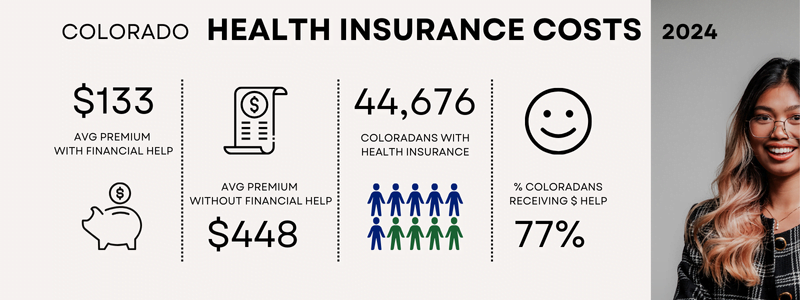Yes, there is help with health insurance premiums in Colorado. Receiving help with your monthly Colorado health insurance premiums depends on your household’s exact annual income and the size of your household.

The Rivera family, with two young children, was struggling to find an affordable health insurance plan after a change in employment. Concerned about the rising costs of health insurance, they weren’t sure if they could continue to provide comprehensive coverage for their family. They reached out to our agency for advice.
We assessed the Rivera family’s income and explained that they might qualify for the advanced premium tax credit to help reduce their monthly Colorado health insurance premiums. We guided them through the application process, helping them understand how to estimate their household income and how the tax credit would apply to their chosen plan.
With our assistance, the Rivera family qualified for a significant tax credit, making a quality health insurance plan within their reach. They were able to enroll in a plan that covered all their family’s needs while staying within their budget. The Riveras were relieved ato have the process made clear and straightforward, ensuring their family remained protected without financial stress.

The Advanced Premium Tax Credit (APTC) is a subsidy provided by the federal government to help lower the cost of Colorado health insurance premiums for individuals and families purchasing coverage through the Health Insurance Marketplace (state health insurance exchanges).
Three Prong Approach
Eligibility for Colorado health insurance premiums help:
- Income Requirements: To qualify for the APTC, your household income must be between 100% and 400% of the federal poverty level (FPL). The exact income range varies based on the size of your household and the federal poverty guidelines for the year.
- Filing Status: You generally must file a joint tax return if you are married (with some exceptions).
- Lack of Other Coverage Options: You cannot be eligible for other qualifying coverage, such as employer-sponsored insurance that is affordable and meets minimum value standards, or government programs like Medicaid, Medicare, or CHIP.
Applying for Colorado health insurance premiums help:
- Enrollment through the Marketplace: You must apply for your health insurance policy through the Colorado Health Insurance Marketplace. During the application process, you will provide information about your household income and size to determine your eligibility for the APTC.
- Estimated Credit: If eligible, the Marketplace will estimate the amount of the premium tax credit you qualify for based on your projected income for the upcoming year.
- Monthly Premium Reduction: You can choose to have the APTC paid directly to your insurance company to reduce your monthly premium payments, or you can pay the full premium amount and receive the credit when you file your federal income tax return.
- Plan Selection: When selecting a plan, the amount of APTC you are eligible for will be applied to lower the cost of your monthly premiums.

Reconciliation at Tax Time:

- Filing Your Tax Return: At the end of the year, you will need to reconcile the amount of APTC you received with the actual amount you were eligible for based on your actual income.
- Form 1095-A: The Marketplace will send you Form 1095-A, which includes information about your insurance coverage and the amount of APTC paid on your behalf.
- Form 8962: You will use Form 1095-A to complete Form 8962, Premium Tax Credit (PTC), on your federal income tax return. This form will help you determine if you received too much or too little APTC.
- Repayment or Refund: If you received more APTC than you were eligible for based on your actual income, you might have to repay some or all of the excess credit when you file your taxes. Conversely, if you received less, you may get the difference as a refundable credit.
Click Here for IRS webpage: Premium Tax Credit Basics.
Click Here to watch an Ian Young Health Insurance video regarding Help With Premiums.

Email Ian Young Health Insurance today or schedule an appointment if considering the Advance Premium Tax Credit with your new Colorado health insurance.
